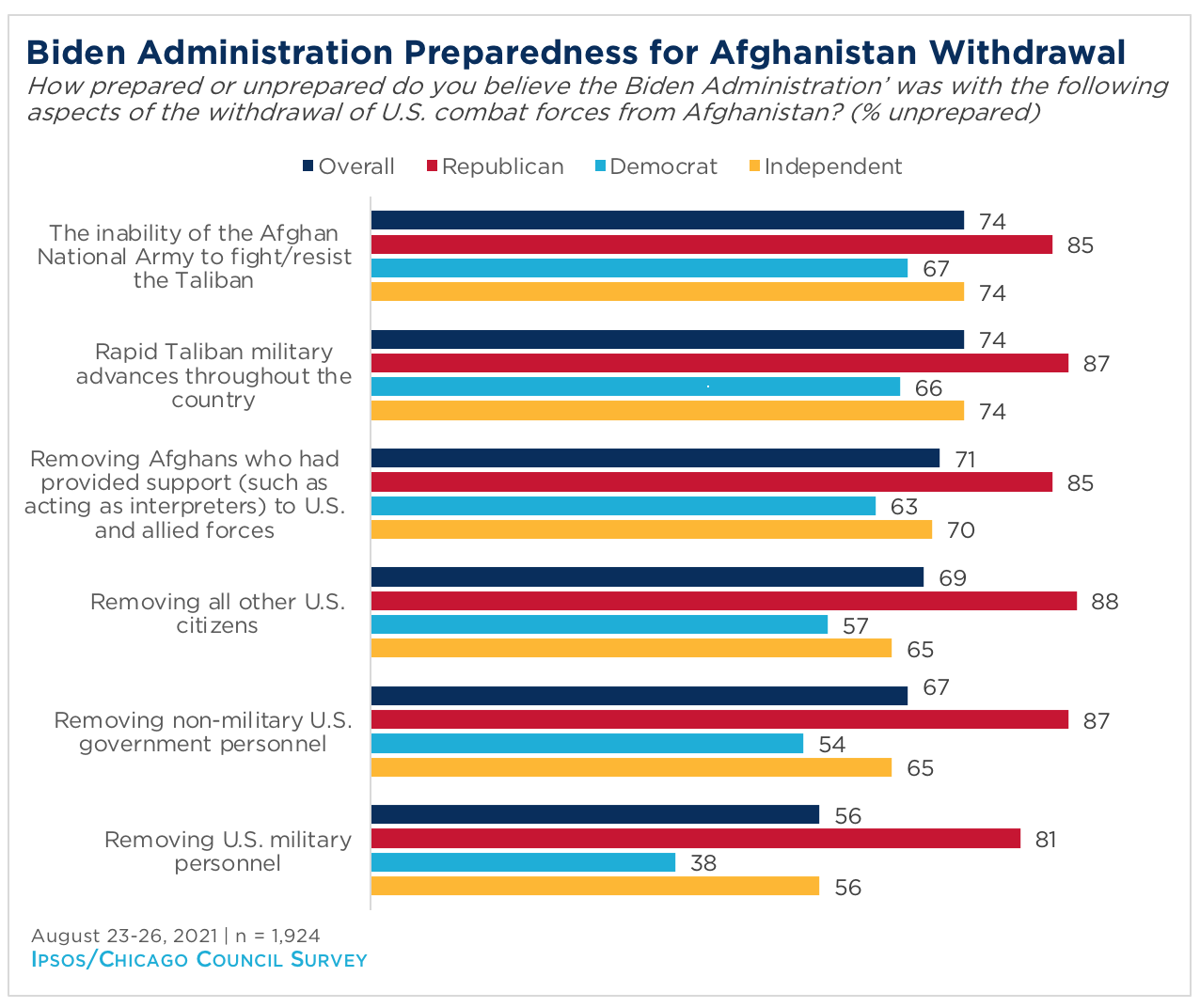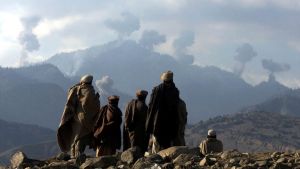Majority of Americans Support Withdrawal from Afghanistan, but Criticize Its Implementation

While two-thirds of Americans overall continue to support the withdrawal, a majority of Republicans now oppose it, a new survey from the Chicago Council on Global Affairs and Ipsos reveals.
A new Chicago Council on Global Affairs-Ipsos survey suggests that most Americans are not second-guessing the US withdrawal from Afghanistan. But they are critical of what they perceive as a lack of planning and forethought on the part of the Biden administration. At the same time, it is unclear how durable an effect these criticisms will have on the Biden presidency once Afghanistan is out of the headlines.
Two in Three Support US Withdrawal, but Republicans Now Oppose
A new Chicago Council-Ipsos survey conducted August 23–26 finds that two-thirds (64%) of Americans continue to support the US withdrawal of troops from Afghanistan. While this survey was conducted mostly before the August 26 suicide bombing that killed 13 US soldiers and at least 170 Afghan civilians, other analyses of attitudes both before and after that attack found little change in overall opinion.
An earlier 2021 Chicago Council Survey, fielded July 7–26 before the Taliban took over the country, found slightly higher support for withdrawal (70%). But there is another key difference with the new August results: the July poll found bipartisan agreement, but attitudes are now more polarized along political lines. Eight in 10 self-identified Democrats (81%) and two in three Independents (65%) support the decision, while a majority of Republicans now oppose it (57%).

Majorities Think Administration Was Unprepared for Many Aspects of Pullout
When asked their views about the Biden administration’s handling of the withdrawal in a general sense, a majority of Americans disapprove (56%), and 43 percent approve. Most Democrats approve (70%), while nine in 10 Republicans (89%) and nearly six in 10 Independents (57%) disapprove.
These overall results echo other recent polls. An August 23–29 Pew Research Center survey found that 42 percent rated the administration’s handling of the situation in Afghanistan poorly, while 29 percent rated it as only fair. An August 18–20 CBS News survey found 70 percent of Americans said the removal of US troops should have been handled better.
Republicans, Democrats, and Independents are aligned, however, in their belief that the Biden team was unprepared for many specific aspects of the withdrawal. Majorities of about seven in 10 say the administration was unprepared for evacuating Afghans who had provided support to US and allied forces (71% overall unprepared), evacuating non-military US government personnel (67%), and evacuating other US citizens (69%). Three-quarters also think the administration was unprepared for the inability of the Afghan National Army to fight or resist the Taliban (74%) and for the rapid Taliban advances throughout the country (74%). On these latter points the Biden administration would likely agree with the public. A number of senior administration officials have expressed shock at how quickly the Taliban forces were able to overpower the Afghan military and take control of Kabul.
Democrats part ways with Republicans and Independents, however, when evaluating whether Biden officials were prepared to remove US military personnel from the country. While 56 percent of the US public overall— including 81 percent of Republicans and 56 percent of Independents— say the administration was unprepared in this respect, Democrats tend to say they were prepared (55%).

How Enduring Will Impact Be on Biden Presidency? For Now, It’s Unclear
A slight majority of Americans believe that the US withdrawal from Afghanistan will have a negative impact on the United States’ global influence (53%). This expectation is higher among Republicans (71%) and Independents (51%) than Democrats (41%). Most who think it will have a negative impact also believe it will be long-lasting (31% of the overall sample) rather than temporary (15% overall). But at the same time, about a quarter of the American public is unsure (27%) and 12 percent think it will have no impact at all. Seven percent think it will have a positive impact.
At the end of the day, it is not yet clear how long the public will remain dissatisfied with the administration’s approach, especially once the withdrawal is no longer leading news. A CBS survey reported that more Americans blamed the Afghan government (60%) and the Afghan army (55%) than they do Biden (36%) for the Taliban taking over the country. And a Reuters-Ipsos survey conducted on August 16 found that 68 percent of Americans agreed that the war in Afghanistan would end badly no matter when the United States left. Biden expressed this sentiment himself on the very same day this survey was conducted, asserting that “there was never a good time to withdraw US forces. That’s why we’re still there.”
The Chicago Council-Ipsos survey (fielded August 23–26) asked Americans to consider the costs and benefits of the war in Afghanistan and whether it was worth fighting. Two in three Americans (63%) say it was not worth fighting, while just 35 percent say it was worth it. This number is very similar to an August 12-16, 2001 AP-NORC survey in which 62 percent said the war was not worth fighting. But even more telling, it is remarkably stable with at least two-thirds who said the war in Afghanistan was not worth fighting in Chicago Council surveys conducted in 2020 (65% not worth the costs), 2014 (71% not worth the costs) and 2012 (67% not worth the costs)— suggesting that Americans had already made their minds up about the value of this long war years ago.




Related Content
 Public Opinion
Public Opinion
Polling conducted in July for the 2021 Chicago Council Survey found seven out of ten Americans supported the withdrawal of US combat forces from Afghanistan by September 11.
 US Foreign Policy
US Foreign Policy
Winning hearts and minds doesn't defeat insurgent groups, author Jacqueline Hazelton argues. So why does the United States still rely on counterinsurgency?